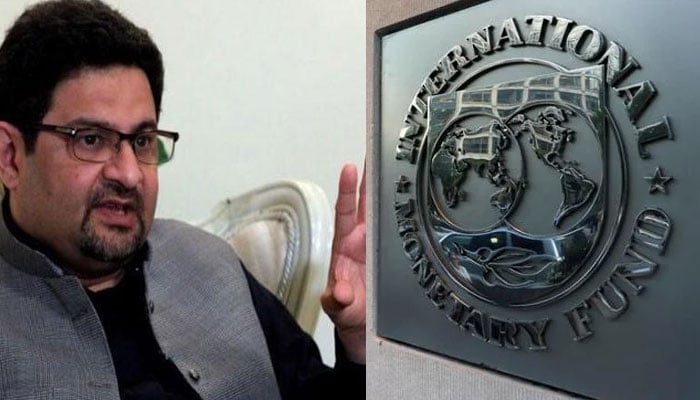Ready for ‘reforms’, Pakistan tells IMF
A source said Secretary Finance Hameed Yaqoob and Chairman FBR Asim Ahmed left for Doha on Wednesday night for holding parleys with the IMF
ISLAMABAD: Pakistan has conveyed its willingness to the IMF negotiation team that it will take 'tough measures' such as hike in the POL products and electricity prices but in a phase-wise approach for reviving the stalled $6 billion fund programme.
According to reports, Pakistani authorities will also make all-out efforts to convince the IMF’s review mission that it should reduce the cost of the burden of inflation that will hit the masses and may request to adopt a phased-wise approach for the reversal of subsidies, especially on the petroleum products.
"Secretary Finance Hameed Yaqoob and Chairman FBR Asim Ahmed left for Doha on Wednesday night for holding parleys with the IMF, while finance minister was expected to join the review meetings from coming Monday," official sources said, while talking to The News on Wednesday.
According to the official statement issued by the Ministry of Finance on Wednesday, Federal Minister for Finance & Revenue Miftah Ismail held a virtual meeting with the IMF mission chief.
The meeting was attended by Minister of State for Finance & Revenue Dr Aisha Ghous Pasha, Secretary Finance, Governor State Bank of Pakistan and Chairman Federal Board of Revenue. Meanwhile, the first batch of the senior management of Finance Division, State Bank of Pakistan and Federal Board of Revenue has already reached Doha for the 7th Review Mission.
The finance minister and minister of state will also join the team in Doha early next week to conclude the discussion with the expectation to reach an agreement for the IMF’s continued support until the successful completion of the programme. The finance minister reaffirmed the government’s commitment to undertake the reforms envisaged under the programme and to complete the structural benchmarks.
IMF Mission Chief Nathan Porter shared the IMF’s assessment of the challenges being faced by the economy with the Minister for Finance & Revenue. He sensitised that Pakistan’s economy demanded both immediate and long-term corrective measures.
Finance minister stated that the government could understand the current economic woes but agreed that tough decisions would have to be taken, while mitigating the effects of the inflation on the middle to low-income groups. He emphasised that few of the factors that have adversely affected the economic situation were beyond the control of the government. These included exogenous factors like supply shocks, commodity super cycle and Russia-Ukraine conflict due to which the commodity prices further soared. These factors were putting pressure on the current account as well as the foreign exchange reserves. The minister stated that the government would take measures to reduce the burden on the economy, while protecting the vulnerable sections of the population was also among the priorities.
The minister further stated that we should aim at addressing structural issues, so that Pakistan is able to end its fiscal deficit and move towards sustainable growth. The finance minister thanked the IMF mission chief for support at such a difficult time for global economy. Both sides showed keen interest to complete the review successfully.
-
 Winter Olympics 2026: When & Where To Watch The Iconic Ice Dance ?
Winter Olympics 2026: When & Where To Watch The Iconic Ice Dance ? -
 Melissa Joan Hart Reflects On Social Challenges As A Child Actor
Melissa Joan Hart Reflects On Social Challenges As A Child Actor -
 'Gossip Girl' Star Reveals Why She'll Never Return To Acting
'Gossip Girl' Star Reveals Why She'll Never Return To Acting -
 Chicago Child, 8, Dead After 'months Of Abuse, Starvation', Two Arrested
Chicago Child, 8, Dead After 'months Of Abuse, Starvation', Two Arrested -
 Travis Kelce's True Feelings About Taylor Swift's Pal Ryan Reynolds Revealed
Travis Kelce's True Feelings About Taylor Swift's Pal Ryan Reynolds Revealed -
 Michael Keaton Recalls Working With Catherine O'Hara In 'Beetlejuice'
Michael Keaton Recalls Working With Catherine O'Hara In 'Beetlejuice' -
 King Charles, Princess Anne, Prince Edward Still Shield Andrew From Police
King Charles, Princess Anne, Prince Edward Still Shield Andrew From Police -
 Anthropic Targets OpenAI Ads With New Claude Homepage Messaging
Anthropic Targets OpenAI Ads With New Claude Homepage Messaging -
 US Set To Block Chinese Software From Smart And Connected Cars
US Set To Block Chinese Software From Smart And Connected Cars -
 Carmen Electra Says THIS Taught Her Romance
Carmen Electra Says THIS Taught Her Romance -
 Leonardo DiCaprio's Co-star Reflects On His Viral Moment At Golden Globes
Leonardo DiCaprio's Co-star Reflects On His Viral Moment At Golden Globes -
 SpaceX Pivots From Mars Plans To Prioritize 2027 Moon Landing
SpaceX Pivots From Mars Plans To Prioritize 2027 Moon Landing -
 J. Cole Brings Back Old-school CD Sales For 'The Fall-Off' Release
J. Cole Brings Back Old-school CD Sales For 'The Fall-Off' Release -
 King Charles Still Cares About Meghan Markle
King Charles Still Cares About Meghan Markle -
 GTA 6 Built By Hand, Street By Street, Rockstar Confirms Ahead Of Launch
GTA 6 Built By Hand, Street By Street, Rockstar Confirms Ahead Of Launch -
 Funeral Home Owner Sentenced To 40 Years For Selling Corpses, Faking Ashes
Funeral Home Owner Sentenced To 40 Years For Selling Corpses, Faking Ashes




